Multiplication Dice Game
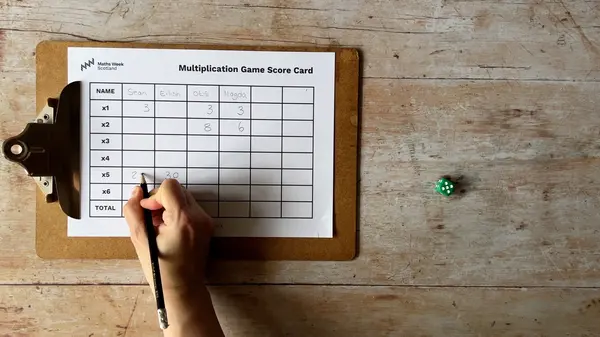
Today we have a really simple game to share with you, that can be played at home, on the go, or in the classroom. The game encourages multiplication and addition skills, and also requires some strategic thinking and considering the probability of what numbers you are going to roll.
You Will Need:
All you need to play is one regular die, and a pen and paper to keep score. Or you can download a copy of our free printable score sheet. The Multiplication Dice Game requires a minimum of two players. Our score card has space for up to six players, but there is no upper limit if you want to play with more.
Aim of the Game
The aim of the game is to be the player with the highest total score at the end. Our score sheet allows you to play six rounds.
How to Play
Players take it in turn to roll the die.
After rolling the die, a player has to decide which of the numbers from 1 to 6 (if you are using our score card) they want to multiply the number on the die with.
For example, if you roll a 3 and decide to multiply it with the 5 on your score card, you would note down 15 points (3 x 5).
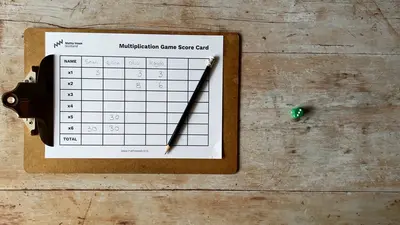
In the first round, you have the choice of all numbers on the score card, but you can use each number only once! That means as the rounds progress, you will have fewer numbers to choose from.
In this example, Sean has just rolled a 5. He has already used the 1 and 6 on his scorecard, so decides to multiply with the 5, recording a score of 25 (5 x 5).
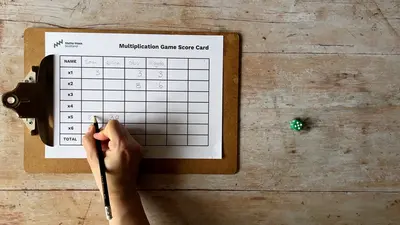
Once all players have filled their score cards, the scores from all six rounds get added up. The player with the highest total score wins. If two or more players have the same score, then they tie for the win.
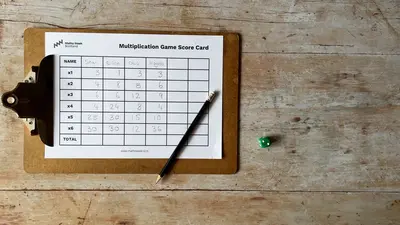
As well as having to recall their times tables, and using the addition skills to total up the scores at the end, players also need to consider wisely which numbers on the score card they want to multiply the die with:
If you roll a 6, you probably want to multiply it by 6 to get a high score of 36. If you a roll a 1, you probably want to multiply it by 1 to forfeit as few points as possible.
But what if you roll a 2, 3, 4 or 5? Are you best to multiply with a high or a low number? For example, if you roll a 4? Do you multiply the 4 by 6 for a score of 24, or do you hold out for a higher roll of 6 for a score of36?
But what if you have already used up the 6 or the 1 on your score card? Which number is best to multiply with next? A If you keep the high numbers on your score card free, in the hope of rolling 5s and 6s for a high score, you might end up rolling 1s and 2s and having the multiply those with the higher numbers. Lots of things to think about!
Variations
- You could play more than six rounds, to multiply with numbers beyond 6. For example, ten or twelve rounds would include multiplication up to the ten or twelve times table. It makes the game longer, but gives children the chance to practice higher number equations.
- You could switch things up, and play for who has the lowest score instead. How would this change your strategy?
Latest News and Events

STEM Ambassadors in Scotland Week 2026
STEM Ambassador in Scotland (SAIS) Week is a celebration of all things STEM in Scotland through the experiences of our STEM Ambassadors.

Active Maths Challenge
Start the year with our mini Active Maths challenge and measure what progress you can make over four weeks.
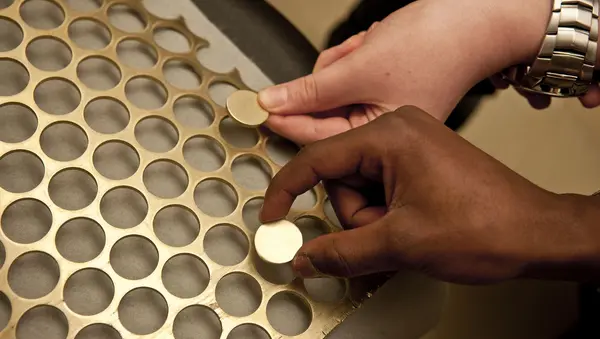
Money Maths at Museum on the Mound
We are excited to offer Maths versions of our popular money-themed schools workshops. These are entirely free of charge. Best suited for P5-P7 pupils.